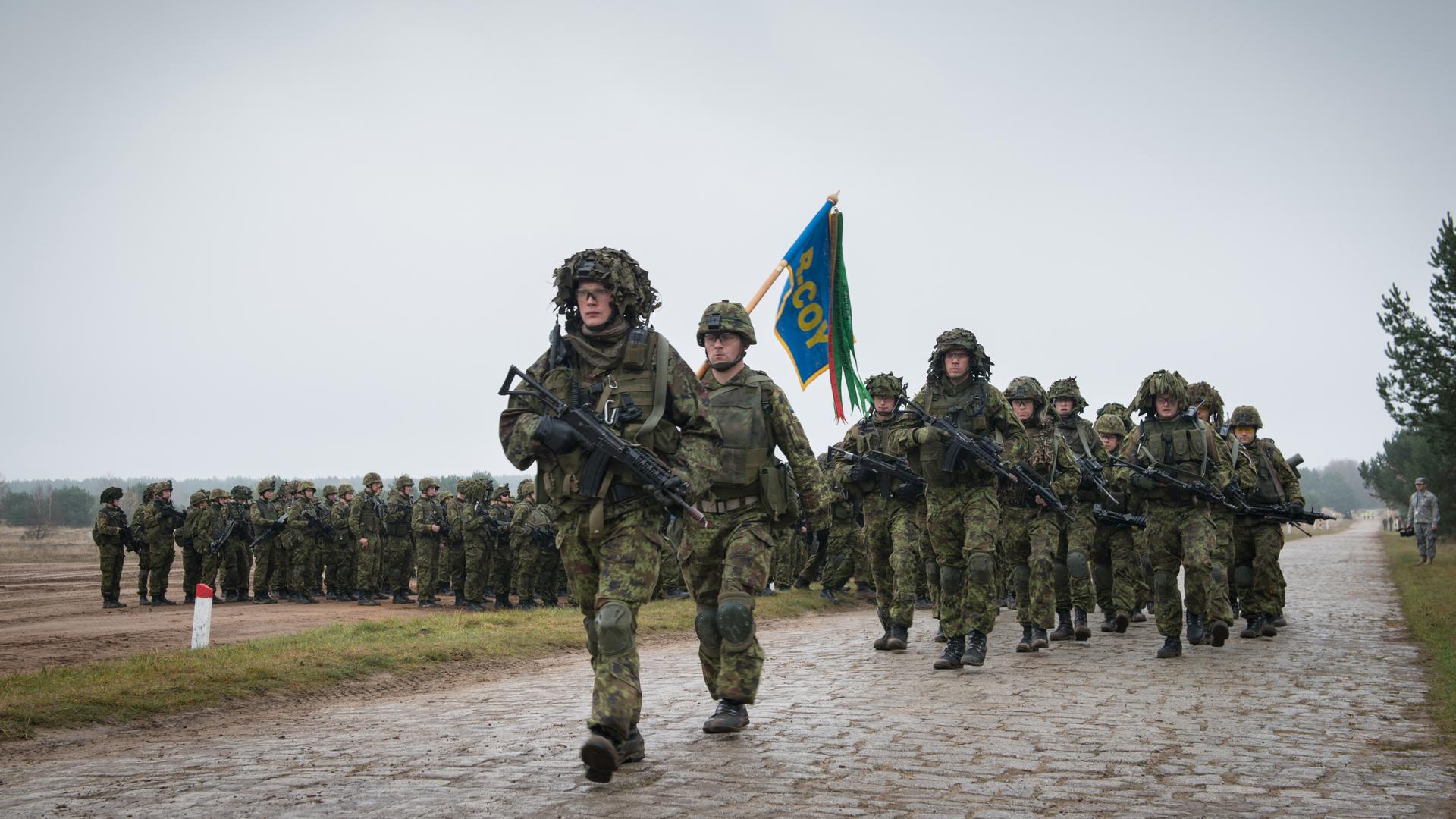Why eastern European nations like Estonia are stressing over Russia
Estonian troops during a NATO exercise in Poland in 2013.
Russia justified its intervention in Ukraine with the argument that it has a duty to protect Russians there. That worries other nations in eastern Europe with large Russian minorities. Countries like Estonia.
"Estonians are definitely worried,” says Juri Toomepuu, an Estonian-American, currently visiting the land of his birth. “But ethnic Russians who've settled in Estonia are quite happy."
Toomepuu adds that they would "welcome Putin's help to restore the privileges they enjoyed during 50 years of occupation."
First, some basic information about the Baltic nation. Estonia is a small nation on the Baltic Sea, just a short distance from the great Russian city of St Petersburg.
Estonia’s original people speak a language related to Finnish, a language that is as different to Russian as English is to Chinese.
Culturally, ethnic Estonians identify more with Scandinavia than Russia. In fact, Russia conquered the territory from Sweden in the 1700s.
Russia coveted the territory to provide a buffer to protect St Petersburg and to increase Russia’s access to the sea.
The Russian empire continued in control until World War I, after which the tiny nation fought and won its independence. But that only lasted until World War II which ended with Estonia annexed to the Soviet Union.
That was when Juri Toomepuu’s family fled Estonia. Toomepuu was just a boy.
The Soviet occupation was brutal. Elites and intellectuals were liquidated. Property was collectivized. Resistance — even criticism — resulted in deportation, torture or death. Even so, guerrilla warfare continued into the 1950s.
The population of Estonia was forced to learn and use Russian. Hundreds of thousands of ethnic Russians were transferred to Estonia and given jobs in new industries and other privileges.
Estonia became independent again in 1991, after the collapse of the Soviet Union.
Since then, the shoe has been on the other foot to some extent.
No one gets citizenship automatically unless their family was resident prior to the Soviet occupation (and that does include quite a few ethnic Russians).
You can qualify for citizenship if you achieve a level of proficiency with the Estonian language, but many Russian speakers have found that hard. As of 2012, about 7 percent of Estonia’s residents are still denied citizenship.
In addition, the use of the Estonian language is mandatory in certain work environments, such as among all public-sector employees and medical professionals. So Russian-speakers are denied access to a lot of jobs.
Many ethnic Russians have left Estonia over the last 20 years, but they still comprise a large proportion of the population: at least one-quarter, perhaps more. Many are concentrated in the north-east, around the city of Narva. Toomepuu is particularly worried about that district being sliced off.
So compared to Ukraine, being an ethnic Russian in Estonia is pretty tough and many Russians are pretty resentful. The tension with ethnic Estonians is very real.
Juri Toomepuu argues that Estonia made an “historic mistake” in allowing Russians to remain in the country after independence, even if denied citizenship.
He says his country should have invoked Article 49 of the Geneva Convention, which says civilians transferred into occupied territories should leave when the occupation comes to end. He says the ethnic Russians might act as a “Fifth Column” on behalf of Putin.
Toomepuu took his opposition to Soviet power seriously. He joined the US army because – in his words – he wanted to fight communists.
He did. He served in the Korean War, and later in Vietnam, where he received the Distinguished Service Cross, for valour.
After the break-up of the Soviet Union, Toomepuu returned to Estonia, and became a member of parliament for several years.
Now he's a writer, living in Florida. Toomepuu rejects a comparison between Russians who refuse to learn Estonian to Hispanics in Florida who fail to learn English.
“Americans come from many different backgrounds,” he says. “And they (all) become loyal Americans. But the Russians in Estonia, they are not loyal to the Estonian republic. They would welcome Putin.”
Toomepuu is currently visiting Estonia to promote his book: "Three Fundamental Problems in Estonia’s Recent History: Thirty-three Solutions."
In his book, he predicted the kind of things that have happened in Ukraine. He jokes that “it seems like Putin did all this actually to promote my book!” It has become a best-seller in Estonia.
As a military man, Toomepuu concludes that there isn’t much Estonia can do by itself to stop any Russian intervention. He says the National Guard should be encouraged to fight on as guerrillas, to try to make the annexation an unpalatable prospect.
He has no confidence in the international community coming to Estonia’s assistance, despite being a full member of NATO.
President Obama and NATO have stated that any move by Russian forces into the territory of NATO members would be crossing a red-line. Article 5 of the NATO treaty requires all members to come to the assistance of any member state subject to an armed attack.
“Most Estonians understand the unfortunate truth,” says Toomepuu. “The United States will not risk a major – or even a tiny minor war – to defend Estonia… Do you think any NATO ally of Estonia would risk any kind of a war or conflict to stop Putin taking it over? I’m more realistic than that. I don’t think there’s any chance whatsoever.”
